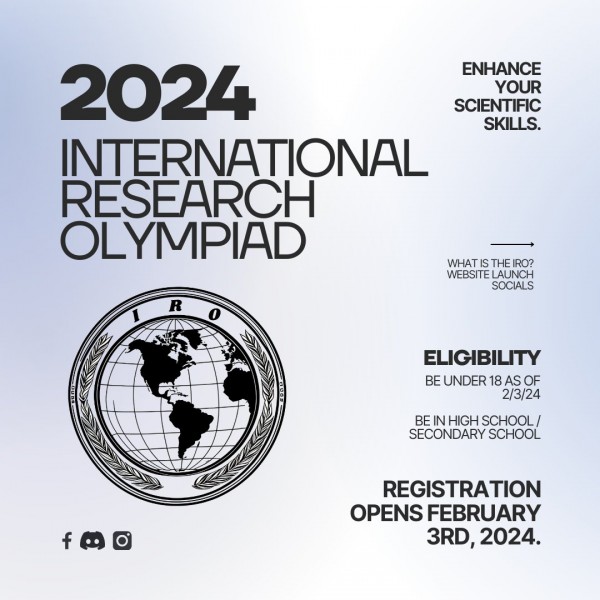|

In the increasingly competitive landscape of college admissions, having a diverse portfolio of extracurricular activities and unique projects is becoming more crucial than just having high grades. Engaging in research projects allows students to independently define problems, collect and analyze data, and propose creative solutions. These skills not only demonstrate academic achievement but also leave a lasting impression on admissions officers. Today, we'll introduce an exceptional opportunity for students passionate about research: the International Research Olympiad (IRO)!
The International Research Olympiad
What is the International Research Olympiad (IRO)? Traditionally, research and Olympiad communities have been distinct, but the International Research Olympiad (IRO) bridges this gap as the world’s first Olympiad solely dedicated to research. Organized by the non-profit Samyak Science Society, IRO aims to enhance students' research skills applicable to academic pursuits.
The Olympiad is operated mainly by Harvard University students and researchers, and consequently, the competition is usually held on the Harvard campus. The inaugural event in March 2024 attracted approximately 3,000 pre-registrations, indicating its growing reputation and value.
Significance of IRO in College Admissions Students aspiring to attend top-tier universities must demonstrate their ability to handle college-level coursework. One way to showcase this academic prowess is through the ability to decode and comprehend complex research papers. The IRO tests students’ knowledge of the research process, making it a valuable extracurricular activity that highlights a student's academic abilities.
How to Participate in IRO The competition includes written exams, research proposal submissions, project presentations, and various unique events. The Open Rounds and Semi-Finals are conducted online, while the 2024 Finals were held at Harvard University. The Olympiad tests creative and critical thinking and analytical skills in fields such as science, technology (including AI), engineering, mathematics, biology, physics, neuroscience, and medicine.
- Eligibility: Students aged 13-18 by the start of the Olympiad, Enrolled in a recognized middle/high school or homeschooling program. Students or student teams can register directly with the organizers without needing to qualify through national Olympiads. - Fees: Open Round registration: $60 (waivers available). The Olympiad finals, held at Harvard University, are virtual, with the organizers covering the finalists' expenses. - Competition Structure: Open Rounds (2) - Semi-Finals - Finals
Schedule Top 15% of participants from the Open Rounds progress to the Semi-Finals, which consist of free-response questions evaluating the understanding and application of scientific concepts. Top 15 participants compete for gold, silver, and bronze medals.
- Registration: February-March 3, 2024 - Open Round: March 7-8, 2024 - Semi-Finals: April 27-28, 2024
- Finals: May 31-June 2, 2024
Preparing for IRO Due to the novelty of the IRO, with few past participants or winners, it is recommended to seek assistance from research experts or mentors when preparing. - Practice, Practice, Practice: Utilize IRO practice problems and explore research papers on ARXIV, Google Scholar, etc., to get familiar with academic research. - Strategic Time Management: Ensure you can complete and review answers within the time limits. Use mock exams for simulation. - Finding a Mentor: Work with researchers, doctoral students, or professors experienced in reading, writing, and interpreting research papers. Understand the different stages of conducting research with their guidance. |
 Click here to book
Click here to book